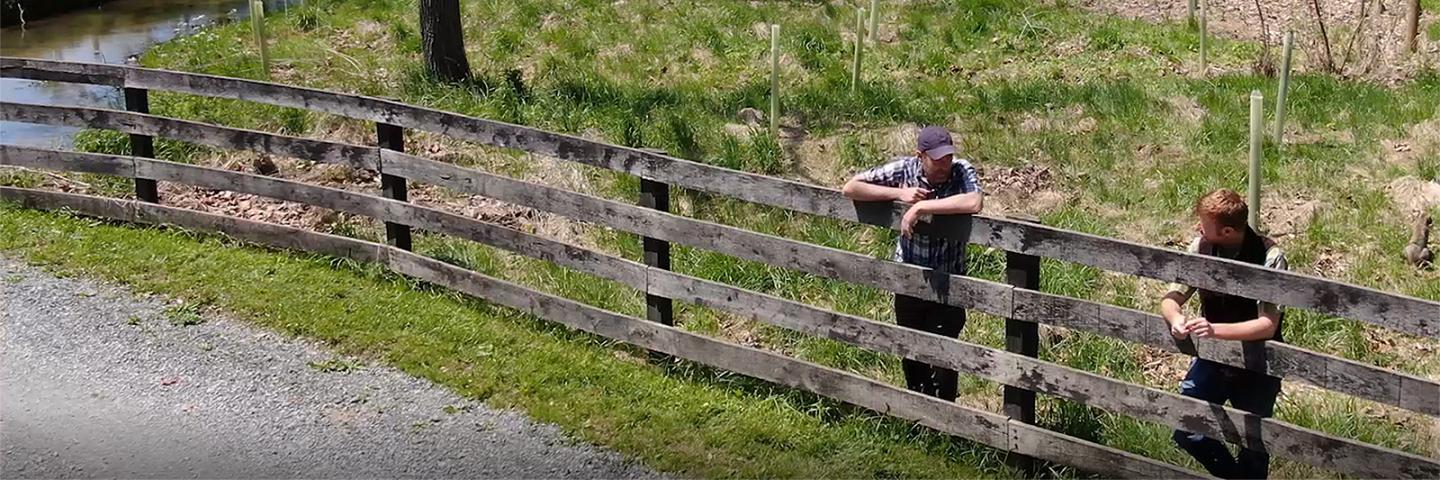NRCS Accepting Applications for 2023 Program Offerings

Want to make your land healthier and more productive, increase the sustainability of your operation, protect/maintain wildlife habitat or preserve your legacy for the next generation? We've got more options this year to help you achieve your stewardship goals.
Richmond, Va. – Virginia farmers and forest landowners shopping for solutions to their conservation problems can now access a full range of funding options from a trusted brand. USDA’s Natural Resources Conservation Service (NRCS) has restocked the proverbial shelves and is now accepting Fiscal Year 2023 applications for three programs that deliver proven results.
Environmental Quality Incentives Program (EQIP). This highly versatile offering is a good fit for most agricultural producers with fund pools for livestock, cropland and forestry. Special initiatives are also available for statewide and targeted conservation activities.
Statewide
- EQIC-CIC - A steppingstone for producers between EQIP Classic and the Conservation Stewardship Program for livestock and cropland practices (New)
- Conservation Planning Activities (CPAs), Design and Implementation Activities (DIAs), and Conservation Evaluation and Monitoring Activities (CEMAs) – Planning, design, implementation and monitoring tasks for NRCS conservation program purposes (previously known as Conservation Activity Plans or CAPSs)
- High Tunnel System – Steel-framed, polyethylene-covered structures to extend the growing season in an environmentally safe manner
- Northern Bobwhite in Pine Savannas and Northern Bobwhite in Working Grasslands – Management strategies to convert plantings to highly valuable pine savanna habitats and native grass restoration to address habitat loss while maintaining or improving cattle production on the land
- On-Farm Energy – Agricultural Energy Management Plans (AgEMP) or farm energy audits to assess energy use and recommend ways to reduce it
- Organic – Practices to help certified organic growers, those working to achieve organic certification and specialty crop producers address resource concerns on their operations
- StrikeForce – Priority ranking for cropland and livestock practices to support program participation among underserved producers in rural communities.
Targeted
- American Black Duck Initiative – Focused conservation practices to restore wintering habitat in the Delaware Bay and Chesapeake Bay watersheds
- Eastern hellbender – Targeted conservation practices to reduce sediment and nutrient inputs for improved habitat and water quality
- Golden-winged warbler – Young forest habitat restoration in Appalachian breeding territory
- Longleaf pine – Stand establishment and management in the Southeastern Virginia historical range
- National Water Quality Initiative (NWQI) – Targeted practices to clean up impaired streams and improve aquatic habitats in the War Branch and Mountain Run watersheds in Rockingham County and Gap Creek in Rockingham and Shenandoah counties
- Joint Chiefs Landscape Restoration Partnership - Targeted funding for Bland, Botetourt and Wythe counties to help improve water quality, terrestrial and aquatic habitat conditions as well as overall ecological integrity.
Conservation Stewardship Program (CSP): This “pay for performance” program allows agricultural producers and forest landowners to earn payments for actively managing and expanding conservation activities like cover crops, enhanced nutrient management and pollinator habitat while maintaining active agriculture production on their land. Incentives like supplemental funding for advanced grazing management and a one-time payment for developing a comprehensive conservation plan offer added benefits. Existing CSP participants may also have a renewal option in the first half of the fifth year of their five-year contract.
CSP is aligned with EQIP through common applications, contracting operations, conservation planning, conservation practices and related administrative procedures. Conservation activities include soil health planning, building soil organic matter through crop rotations and practices that help producers adapt to or mitigate impacts of changing weather conditions. CSP also encourages the adoption of cutting-edge technologies and new management techniques such as precision agriculture applications and new soil amendments to improve water quality.
Agricultural Conservation Easement Program (ACEP): This two-in-one offering can be a great resource for restoring and maintaining the state’s wetlands and safeguarding working farms. The Agricultural Land Easement (ALE) component is designed to help save productive crop, grass, pasture and nonindustrial forestland from conversion to non-agricultural uses. The revised program agreement structure is designed to increase administrative efficiency for entities like state and local governments and non-governmental organizations with farmland protection programs who will serve as easement holders and the matching requirement includes acquisition expenses and stewardship costs with no minimum cash match required.
Landowners looking to restore or maintain wetlands can visit their local NRCS office to explore opportunities available through the Wetland Reserve Easement (WRE) component. Properties eligible for WRE include farmed wetlands that can be successfully and economically restored; former or degraded wetlands with a history of agricultural use; wetlands farmed under natural conditions; and “prior-converted” cropland converted on or before Dec. 23, 1985. Conservation Reserve Program (CRP) land established with trees may also be eligible for enrollment through a waiver process. NRCS pays 100 percent of the easement value for the purchase and 100 percent of the restoration costs for permanent easements. Landowners can also select a 30-year option and receive 50 to 75 percent of those costs.
“Virginia NRCS has options available for producers at every stage of the stewardship journey,” said Virginia State Conservationist Dr. Edwin Martinez Martinez. “We can get you started with EQIP, help you take those efforts to a higher level through CSP and protect the land for future generations with a conservation easement. Your local team can help you find the right fit for your land management goals while also connecting you with other conservation partners.”
Applications are available at your local USDA Service Center or online on our Get Started with NRCS web page and will be accepted until Nov. 4, 2022. All applicants must have farm records established with USDA's Farm Service Agency (FSA). Advance payment options are available for historically underserved* producers. Learn more about Virginia Farm Bill programs.
* Historically underserved producers include beginning, socially disadvantaged, veteran and limited-resource farmers or ranchers. (Click on the link to access full definitions for each category above.)

